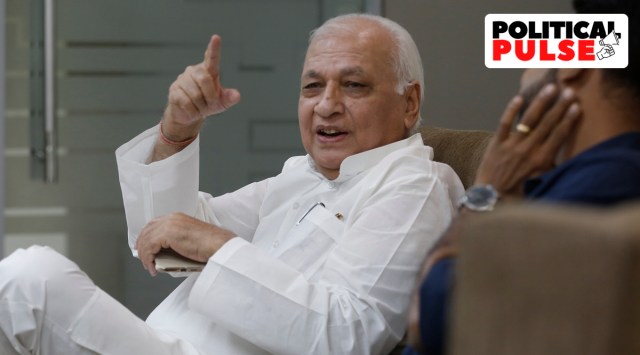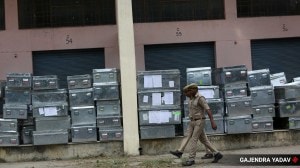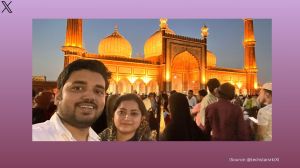- India
- International
Kerala Governor Arif Mohammed Khan interview: ‘Shah Bano, Satanic Verses… issues were dealt with not on merit but to build vote banks, a disaster for country’
"In a civilised society, there is no room for violence or taking the law in one’s own hands," says Arif Mohammed Khan.
 Kerala Governor Arif Mohammed Khan during an Idea Exchange. (Express Archive)
Kerala Governor Arif Mohammed Khan during an Idea Exchange. (Express Archive)The ban on Satanic Verses by the Rajiv Gandhi government in 1988 followed its decision to circumvent the Shah Bano judgment and to allow shilanyas at Babri Masjid, all seen as measures taken to placate different sectarian groups. Khan, a staunch advocate of reforms in Muslim personal laws, had quit the Rajiv government over its actions following the Shah Bano order. Excerpts from an interview:
How do you see the attack on Salman Rushdie 33 years after a fatwa was issued against him by Iran’s Ayatollah Khomeini?
So far, we do not know about the antecedents of the assailant. But the general impression is that the attack has something to do with the fatwa. In a civilised society, there is no room for violence or taking the law in one’s own hands. This heinous act deserves severe condemnation.
How do you see the growing, and disturbing, trend of violence in the name of blasphemy?
Violence in the name of blasphemy is reprehensible and violates basic scriptural teachings that prescribe to ‘turn away from vain talk and say: To us our deeds and to you yours: Peace be on you, we seek not engagement with ignorant (Quran 28.55)’.

Three events that happened in the second half of the 1980s were said to be linked — the Rajiv Gandhi government’s decision to overturn the Supreme Court judgment in the Shah Bano case by bringing a legislation in Parliament, the decision to open the locks of the Babri Masjid, and the ban on Rushdie’s Satanic Verses. You resigned from the government over the decision overturning the Shah Bano judgment. How do you see what happened?
I have written and spoken about these events in detail. It is intriguing that India was the first country in the world that banned the book. Next day there was a protest march in Pakistan and anger was shown on the ground that India had acted, but the Muslim government of Pakistan had not banned the book. On the first day itself, more than 10 lives were lost and property worth crores burnt down. Later, Muslim countries started competing with each other and the fatwa of Iran came.
About three months later, in response to my question in Parliament, the government replied that after the ban, not a single copy of the book was seized. Actually, the book had record sales after the ban. It is also interesting that Sri Syed Shahabuddin, who played a crucial role in getting the Shah Bano judgment overturned, was the man who wrote to Sri Rajiv Gandhi demanding the ban, and he was immediately obliged. Mr Shahabuddin himself later admitted that personally he had not read the book and the ban was demanded on the basis of some news reports.
In 2015, senior Congress leader P Chidambaram, who was Minister of State for Home at the time of the ban on Satanic Verses, said the decision was wrong. What in your view prompted Rajiv Gandhi to take that decision?
Around 2015, many senior Congress leaders found fault with the somersault on Shah Bano as well. But in 2017, it was the Congress leaders who were again supporting the (All India Muslim) Personal Law Board and did not allow the law banning triple divorce to be enacted in the Rajya Sabha. The law could be enacted only in 2019, when their numbers in the Rajya Sabha dwindled. All these issues which you have referred to were dealt with not on merit but purely to build sectional vote banks, and the consequences proved disastrous for the country.
After all these years, the ban on the book has still not been revoked. Do you think it is time to revoke the ban?
Possibly because the decision makers were themselves not sincere about the ban, they made no attempt to stop sales of the book.
How should politics in a democracy like India — where identity politics plays a big role — respond to challenges to freedom of expression? What is the tension between politics and judiciary on this?
Freedom of expression is a sacred right, it is part of our fundamental rights, (there is) sort of a national commitment to uphold it. More than that, it is part of our cultural heritage. Historically, India is known not only for promotion of knowledge and wisdom but also for its free spirit. For example, Charvaka rubbished everything that Indians held sacred but nobody abused him or threw a pebble at him. Instead he was referred to respectfully as Mahatma, an acknowledgement of his cerebral powers.
In fact, the Sanskrit language has no word for blasphemy. Ishninda (criticism of God) is a term of recent vintage. That explains the proverbial Indian tolerance or respect and acceptance of diverse traditions. These unfortunate episodes make it abundantly clear that it is extremely dangerous to compromise long-term national interests at the altar of political convenience.
Apr 24: Latest News
- 01
- 02
- 03
- 04
- 05







































